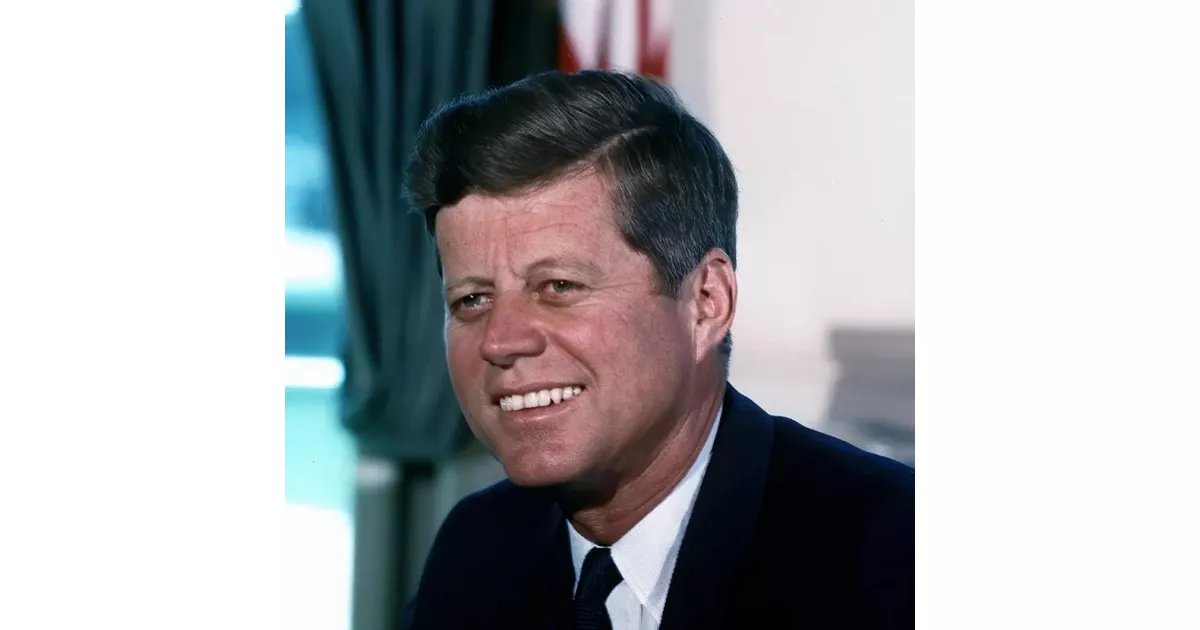Controversies are a part of history. Explore the biggest scandals linked to John F. Kennedy.
John F. Kennedy (JFK) was the 35th U.S. President, serving from 1961 until his assassination in 1963. The youngest person elected president, he led the nation during the Cold War, focusing his foreign policy on relations with the Soviet Union and Cuba. A Democrat, Kennedy previously represented Massachusetts in both the House and Senate.
1947: Opposition to the Labor Management Relations Act
In 1947, Kennedy opposed the Labor Management Relations Act, which restricted the power of labor unions.
1947: Lodge Voted for the Taft-Hartley Act
In 1947, Lodge voted for the Taft-Hartley Act of 1947.
1947: Aftermath of Taft-Hartley Act
The bill Kennedy introduced in 1958 to prevent the expenditure of union dues for improper purposes or private gain; to forbid loans from union funds for illicit transactions; and to compel audits of unions, which would ensure against false financial reports was the first major labor relations bill to pass either house since the Taft–Hartley Act of 1947.
January 30, 1949: Speech denouncing Truman
On January 30, 1949, Kennedy denounced President Truman and the State Department during a speech in Salem, Massachusetts, for contributing to the 'tragic story of China'.
1950: Support for the Internal Security Act
In 1950, Kennedy supported the Internal Security Act, which required communists to register with the government.
1954: Abstention from McCarthy Censure Vote
In 1954, Kennedy was the only Democrat not to cast a vote against Joseph McCarthy's censure due to hospitalization, damaging his support among liberals.
1956: Impact of abstention on 1956 election
Kennedy's abstention from the vote to censure Joseph McCarthy in 1954 damaged his support among members of the liberal community in the 1956 elections.
September 1957: Vote on Civil Rights Act
In September 1957, Kennedy cast a procedural vote against President Eisenhower's bill for the Civil Rights Act, later voting for Title III and the 'Jury Trial Amendment', which were seen as weakening the Act.
1957: Joined Senate's Select Committee on Labor Rackets
In 1957, Kennedy joined the Senate's Select Committee on Labor Rackets with his brother Robert, investigating racketeering in labor-management relations, leading to dramatic arguments with labor leaders like Jimmy Hoffa.
1959: Bill to Eliminate Loyalty Oaths
In 1959, Kennedy introduced a controversial bill to eliminate loyalty oaths and affidavits from aid recipients under the National Defense Education Act of 1958.
1960: Impact of abstention on 1960 election
Kennedy's abstention from the vote to censure Joseph McCarthy in 1954 damaged his support among members of the liberal community in the 1960 elections.
April 4, 1961: Approval of Bay of Pigs Invasion Plan
On April 4, 1961, Kennedy approved the final plan for the Bay of Pigs invasion, a CIA-backed operation to overthrow Fidel Castro's regime in Cuba, despite the risk of escalating tensions with the Soviet Union.
April 15, 1961: Bombing of Cuban Airfields
On April 15, 1961, eight CIA-supplied B-26 bombers left Nicaragua to bomb Cuban airfields as part of the Bay of Pigs invasion plan, but the mission failed to significantly damage Castro's air force.
June 1961: Assassination in the Dominican Republic
In June 1961, the leader of the Dominican Republic was assassinated, leading to a cautious reaction by the U.S. Robert Kennedy expressed his displeasure with Undersecretary of State Chester Bowles's reaction.
November 1961: Authorization of Operation Mongoose
In November 1961, Kennedy authorized Operation Mongoose, a covert program aimed at overthrowing Castro through espionage, sabotage, and other tactics.
1961: Disagreement on Medication
Into late 1961, disagreements existed among Kennedy's doctors concerning the balance of medication and exercise, while Kennedy preferred the former because he was short on time and desired immediate relief.
1961: Vienna Summit Medication
Kennedy was reportedly taking a combination of medications to manage his chronic severe back pain during the 1961 Vienna Summit. The combination included hormones, animal organ cells, steroids, vitamins, enzymes, and amphetamines.
March 1962: Rejection of Operation Northwoods
In March 1962, Kennedy rejected Operation Northwoods, a proposal for false flag attacks against American military and civilian targets, that would be blamed on the Cuban government to justify a war against Cuba.
March 1962: Weekend with Marilyn Monroe
It has been reported that Kennedy spent a weekend with Marilyn Monroe in March 1962 while he was staying at Bing Crosby's house.
October 14, 1962: Discovery of Soviet Missile Sites in Cuba
On October 14, 1962, CIA U-2 spy planes photographed the Soviets' construction of intermediate-range ballistic missile sites in Cuba, leading the Kennedy administration to perceive an immediate nuclear threat.
February 8, 1963: Overthrow and Execution of Qasim
On February 8, 1963, the Iraqi Ba'ath Party overthrew and executed Qasim in a violent coup. The Kennedy administration approved a $55-million arms deal for Iraq.
July 1963: Hoover Reports Affair Allegations
In July 1963, J. Edgar Hoover reportedly informed Robert Kennedy about an affair with a woman "suspected as a Soviet intelligence agent, someone linked to East German intelligence."
August 28, 1963: March on Washington for Jobs and Freedom
On August 28, 1963, over 250,000 people, primarily African Americans, participated in the March on Washington for Jobs and Freedom. Kennedy initially opposed the march and after being warned about communist advisors of Martin Luther King, Jr., Robert Kennedy authorized the FBI to wiretap King and other leaders of the Southern Christian Leadership Conference.
November 1, 1963: Coup Against Diem
On November 1, 1963, a junta of senior military officers executed a coup in South Vietnam, leading to the arrest and assassinations of Diem and Nhu on November 2.
1979: House Select Committee on Assassinations Conclusion
In 1979, the U.S. House Select Committee on Assassinations concluded, with one third of the committee dissenting, that Kennedy was probably assassinated as a result of a conspiracy.
2008: Confirmation of Ghostwriting Rumors
In 2008, Ted Sorensen's autobiography confirmed rumors that Kennedy's book "Profiles in Courage" was ghostwritten by Sorensen.
November 2013: Public Belief in Conspiracy
A Gallup Poll in November 2013 showed 61% believed in a conspiracy, and only 30% thought that Oswald acted alone in the assassination of Kennedy.
2014: Washington Post Survey
In 2014, a Washington Post survey of the American Political Science Association ranked Kennedy 14th highest overall among presidents but also identified him as the most overrated U.S. president.
Mentioned in this timeline

Jupiter is the fifth and largest planet from the Sun...

Martin Luther King Jr was a pivotal leader in the...

The White House located at Pennsylvania Avenue NW in Washington...

Marilyn Monroe was an iconic American actress and model who...

The stock market is where buyers and sellers trade stocks...
The Union of Soviet Socialist Republics USSR existed from to...
Trending

48 minutes ago Eddie Vedder's vulnerability shines in 'Matter of Time,' activism and EB research highlighted.
48 minutes ago Gold and Silver Market: Conflict and Uncertainty Impact Prices, ETF Investment Advised.
2 hours ago Smoothie King Employees Fired for Refusing Service to Customer Wearing Trump Hoodie.

2 hours ago Sydney Sweeney stuns fans with daring lingerie and tights poses for Syrn.

2 hours ago Justin Timberlake Sues to Block Release of DWI Arrest Video in Sag Harbor

2 hours ago Josh Duhamel Opens Up About His Divorce with Fergie, Expresses No Regrets.
Popular

Jesse Jackson is an American civil rights activist politician and...

Hillary Diane Rodham Clinton is a prominent American politician lawyer...

Jim Carrey is a Canadian-American actor and comedian celebrated for...

XXXTentacion born Jahseh Dwayne Ricardo Onfroy was a controversial yet...

Michael Joseph Jackson the King of Pop was a highly...

Bill Clinton served as the nd U S President from...
